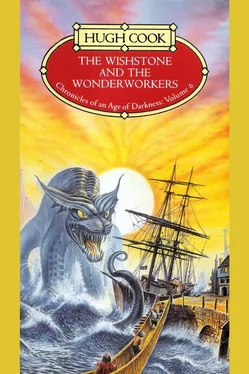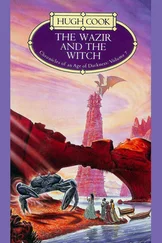Hugh Cook - The Wishstone and the Wonderworkers
Здесь есть возможность читать онлайн «Hugh Cook - The Wishstone and the Wonderworkers» весь текст электронной книги совершенно бесплатно (целиком полную версию без сокращений). В некоторых случаях можно слушать аудио, скачать через торрент в формате fb2 и присутствует краткое содержание. Жанр: Фэнтези, на английском языке. Описание произведения, (предисловие) а так же отзывы посетителей доступны на портале библиотеки ЛибКат.
- Название:The Wishstone and the Wonderworkers
- Автор:
- Жанр:
- Год:неизвестен
- ISBN:нет данных
- Рейтинг книги:4 / 5. Голосов: 1
-
Избранное:Добавить в избранное
- Отзывы:
-
Ваша оценка:
- 80
- 1
- 2
- 3
- 4
- 5
The Wishstone and the Wonderworkers: краткое содержание, описание и аннотация
Предлагаем к чтению аннотацию, описание, краткое содержание или предисловие (зависит от того, что написал сам автор книги «The Wishstone and the Wonderworkers»). Если вы не нашли необходимую информацию о книге — напишите в комментариях, мы постараемся отыскать её.
The Wishstone and the Wonderworkers — читать онлайн бесплатно полную книгу (весь текст) целиком
Ниже представлен текст книги, разбитый по страницам. Система сохранения места последней прочитанной страницы, позволяет с удобством читать онлайн бесплатно книгу «The Wishstone and the Wonderworkers», без необходимости каждый раз заново искать на чём Вы остановились. Поставьте закладку, и сможете в любой момент перейти на страницу, на которой закончили чтение.
Интервал:
Закладка:
In Chegory’s case, his one overwhelming desire had been to get the hell out of the mazeways Downstairs, and this was the desire the drug had activated when it had reduced him to an unthinking zombie.
Okay. What now?
He was still tired. Very very tired. Else the knowledge of his vulnerability to horrifying flashbacks would have had him running round in circles screaming in terror. As it happened, he was so shagged out he did little more than acknowledge his vulnerability as a last refining touch to his day of disaster.
Fatigue suggested sleep.
What else could he do?
Was there anything to be gained from a quick release from imprisonment Downstairs?
No.
Since so many prisoners had escaped from the treasury with so much loot there would doubtless be dozens of soldiers scouring the underground mazeways right now, so there was scarcely any point in Chegory rushing to the pink palace to advise the authorities that the pirates who had thieved the wishstone were still below decks. If a search could catch those Malud marauders then it would. Nobody caught Downstairs at a time like this would be presumed innocent, so there was no reason for Chegory to dare his life into the sunlight just so he could accuse the wayward foreigners.
Meantime, he was safest here.
Safe from hunting soldiers?
Probably, since he had stumbled into some storeroom for liquor. Such places were chosen by experts for their invulnerability to search.
But what if said experts find me in my sleep?
There was a risk of that, true. But life had become so dangerous, so fraught with peril, so stressed and unpredictable that Chegory accounted that little additional risk as next to nothing.
He sat back against a liquor barrel, closed his eyes and promptly dropped off to sleep.
Elsewhere, in the Temple of Torture in Goldhammer Street which was serving as a detention centre, Shabble burnt free of a clay pot at a bottom of a well. Steam boiled out of the well as Shabble ascended, shining bright and singing brighter yet.
It was night. Soon the sun would rise and the sun bells would ring out from the belfries at the four corners of the pink palace to announce the end of bardardomootha and the start of istarlat. But, for the moment, dark reigned, and Shabble’s localised attempts to subvert that legitimate reign drew protests from adherents of the ruling regime.
‘Blow out the light, you nuk!’ screamed an angry fishwife. ‘I blow out not,’ said Shabble. ‘I’m a candle not.’ Torrential abuse followed, as if Fistavlir had ended and the long-awaited trade winds had brought downfalling curses rather than downfalling water. Shabble, entirely unperturbed by this onslaught, darted about the temple, seeking friends.
‘Oh, there you are, there you are,’ said Shabble, shining sun-bright light on a comatose Ivan Pokrov.
The head of the Analytical Institute woke. Stared at Shabble. Mumbled incoherently. Then Artemis Ingalawa said, in very wide awake tones:
‘Shabble! Get out of here! Vanish!’
She Who Must Be Obeyed was obeyed. Shabble’s light dimmed immediately to nothing and the demonic one soared up, up, up into the night sky. The humid darkness of Injiltaprajura and of the polluted Laitemata fell away below. All Untunchilamon came in sight, a mass of dark within dark, reaching away for league upon league from Justina’s capital to the desolations of the north.
Higher and still higher yet flew Shabble, ascending imaginary mountains in nary more than a couple of heartbeats. Exulting in pure speed flew Shabble. So does the dolphin exult when from the water it explodes in joy shimmering. So does the dragon rejoice when in its strength it holds the heights then plunges, diving with a scream, with power ferocious, with speed controlled and absolute precision, terror matched to beauty as it stoops. Up rose Shabble in such triumph until the very curvature of the planetary surface was clearly to be perceived, and the sun also, the sun of the new day.
Then sang Shabble, then Shabble sang, louder and then louder yet, pouring out music unheard for twenty thousand years, rejoicing in the Symphony of the Sun, a song of joy to exult and honour all those who argue with mortality, a paean of praise for the will to be and to become, for ambition unlimited, audacity vaulting and the triumph of the moment.
Shabble rose yet higher. Singing singing singing to the rising sun, the local star, the star itself delighting as it sang with a song fiercer and braver yet than any known to creatures of the flesh, its joy a blaze of energy unleashed, exploding light outburning in vacuum wastelands a hundred million luzacs distant.
Glory to life!
Glory to us and our becoming!
And to the sun, glory!
And to the rising sun, glory!
Thus Shabble, singing as if to rival the sun itself.
Non servium.
CHAPTER THIRTEEN
‘What’s this?’ said Log Jaris, holding aloft a lantern.
No answer came from Chegory Guy who was deep in dream. At that very moment his noncqnscious fantasising was modulating from horror ad nauseum to mere absurdity. He dreamt of an acanaceous cabbage with thaumaturgic tendencies multiplying onyx and zircon to the lapidarian delight of a quivering grannam.
‘What is cabbage but a form of aliment?’ said Chegory, imagining (in his dream) that he had never seen such except in woodblock prints of foreign origin, though in point of fact he knew cabbage well enough since it grew (albeit poorly) in the market gardens of Injiltaprajura.
‘Cabbage is god,’ said cabbage.
Already the cabbage was inimically exerting its granitic will to crush him, all goodwill gone, just badwill remaining, its cassava cyanide, its perfume dung. Crushed, he fell. Yattering ants mocked his valour useless, his courage absurd, his pride misjudged, his skin tarnished with undeniable Ebrell Island red.
‘Wake up, boy,’ said Log Jaris, outside his dream.
‘I am awake,’ said Chegory (or imagined he said) within the dimensions of dream.
Where his unicorn speared her, where she moulded his mangos soft in her hands, her fingers palpating, his banana vomiting, his ants talking the language of sea slugs and carrots as they crawled across her nipples, her hair trailing across his cheeks as Varazchavardan aped monkey in the blue-stained topsails of a coconut tree.
‘Must I kick you awake?’ said Log Jaris.
Answer came there none.
So he kicked.
Not too hard, but hard enough.
Young Chegory Guy snorted, gasped, jerked awake, remembered his knife and grabbed for it, only it was the wrong boot he grabbed for.
‘A blade?’ said Log Jaris, observing the empty boot sheath by lamplight. ‘No blade there, boy! Who are you?’ Slowly Chegory got to his feet. Looked Log Jaris full in the face. Then turned away.
‘Don’t turn your back on me, boy!’ said Log Jaris, grabbing him by the shoulder and spinning him round. ‘I’m not that ugly.’
‘You’re a hallucination,’ said Chegory calmly.
Quite a reasonable assumption, under the circumstances. For Log Jaris was a monster with the body of a man but the head and horns of a bull.
‘What?’ said Log Jaris in startlement. ‘I’m a what?’
‘A hallucination. I don’t believe in you.’
‘You don’t believe in me!’ said Log Jaris, slapping a heavy hand on Chegory’s shoulder. His heavy hand gripped hard then shook the boy. Not much — but enough. ‘You don’t believe in me? What about this? Do you believe in this?’ Log Jaris grasped Chegory’s collar bone between thumb and finger. He increased the pressure. ‘Hurts, doesn’t it? You’re awake, right? Not dreaming! But drunk, perhaps. Are you drunk, my boy?’
‘I’ve dosed on zen,’ said Chegory.
‘You’ve what?’
Читать дальшеИнтервал:
Закладка:
Похожие книги на «The Wishstone and the Wonderworkers»
Представляем Вашему вниманию похожие книги на «The Wishstone and the Wonderworkers» списком для выбора. Мы отобрали схожую по названию и смыслу литературу в надежде предоставить читателям больше вариантов отыскать новые, интересные, ещё непрочитанные произведения.
Обсуждение, отзывы о книге «The Wishstone and the Wonderworkers» и просто собственные мнения читателей. Оставьте ваши комментарии, напишите, что Вы думаете о произведении, его смысле или главных героях. Укажите что конкретно понравилось, а что нет, и почему Вы так считаете.












